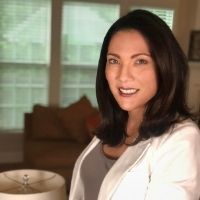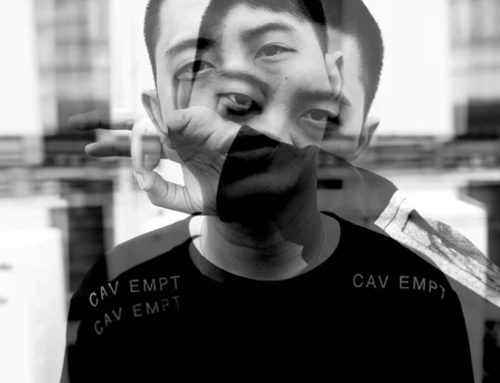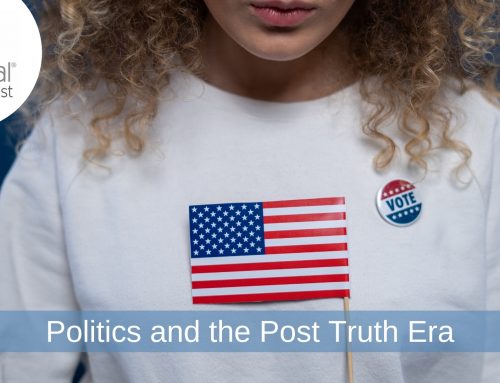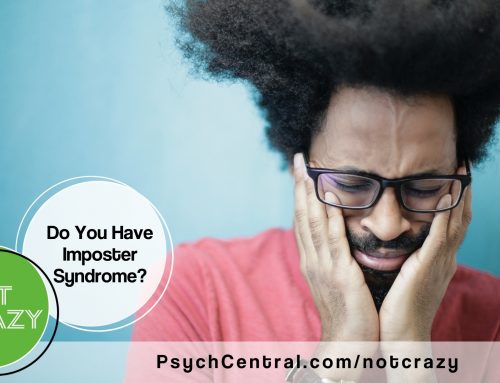From closed schools to social distancing to wearing masks, it’s a strange new world for children thanks to COVID-19. Many kids have lost their regular routines of attending class, seeing their friends, and engaging in sports and other activities. So how can we help kids deal with the anxiety of transitioning to this “new normal?”
In today’s show, we welcome Ada Perez, author and life coach, who explains how to address children’s anxieties during these stressful times. Click on the player below to listen now!
SUBSCRIBE & REVIEW
Guest information for ‘COVID Anxiety in Children’ Podcast Episode

Adacelis (Ada) Perez is an author, certified life coach and communications professional with a passion for mindful parenting. Her memoir/self-help book Anxious Mom, Anxious Child: A Mother’s Journey from Anxiety to Serenity was ranked among the top 100 hundred on Amazon’s Family and Personal Growth Category. A two-time recipient of CNN’s Peabody Award Certificate for her collaboration on the network’s coverage of the Arab Spring and Hurricane Katrina, Ada has worked as a publicist for internationally renowned news anchors, orchestrated major public relations and social marketing campaigns, and helped develop successful communications programs for some of the world’s leading organizations. She studied mass communications at The University of Puerto Rico and is working toward her Masters’ in Clinical Mental Health Counseling at Mercer University in Atlanta. Both bilingual and bicultural, she was born in Puerto Rico, and has called Georgia home for the past twenty years. Ada lives in the suburban city of Roswell, Georgia, with her son and fiance.
Computer Generated Transcript for ‘COVID Anxiety in Children’ Episode
Editor’s Note: Please be mindful that this transcript has been computer generated and therefore may contain inaccuracies and grammar errors. Thank you.
Announcer: You’re listening to the Psych Central Podcast, where guest experts in the field of psychology and mental health share thought-provoking information using plain, everyday language. Here’s your host, Gabe Howard.
Gabe Howard: Hello, everyone, and welcome to this week’s episode of The Psych Central Podcast, I’m your host Gabe Howard and calling into the show today, we have Ada Perez. Ada is an author and communications professional with a passion for mindful parenting. Her book, Anxious Mom, Anxious Child: A Mother’s Journey from Anxiety to Serenity, was ranked among the top 100 on Amazon’s family and personal growth category. She’s a two-time recipient of CNN’s Peabody Award certificate, and she makes her home in the suburbs of Georgia. Ada, welcome to the show.
Ada Perez: Thank you for having me. Gabe.
Gabe Howard: Well, I am very excited to have you here, everybody is talking about COVID and the coronavirus and the anxiety that that is causing to adults. Nobody’s really talking about anxiety in children. Do you feel that that’s the case, that we’re missing this piece?
Ada Perez: Absolutely, it is concerning enough that most children are not able to go to school in person and see their friends and have a normal routine. And now on top of that, you have to adapt to the fact that your parents maybe are having extreme financial hardship. But how about their mental health? Are we focusing on the impact of not having them have a normal social exchange with their friends? Sometimes children are not able to even connect with their own family, with their grandparents because of COVID-19.
Gabe Howard: When people talk about anxiety and children, I am one of the adults that just knee jerk rolls my eyes, I really am honestly that guy, I think to myself, Oh really? A child has anxiety. You’re five. You’re 10, you’re 15. What anxiety could you possibly have? The first thing that I want to say is that’s wrong. It’s wrong of me to feel this way under any circumstances. But somebody said something to me the other day that made me realize that I was just incredibly short sighted during a global pandemic. One, it’s a global pandemic. So maybe we need to update our thought processes on a lot of things. But somebody said to me, you know, the children of America were picked up from school in March and they never went back. They haven’t seen their friends since then. They don’t know what’s going on because adults don’t know what’s going on. So they’re not only getting the same mixed messages we are, but the people in their lives, their parents, their grandparents, their adults who they looked at for authority, and specific answers are not able to provide them. I can’t imagine what kind of anxiety issues that would cause a child who is already trying to learn about the world. What are your thoughts on all of that?
Ada Perez: Well, first of all, anxiety among children is not new. In fact, according to UCLA, from 12 to 20 percent of all children in the United States, we see some form of anxiety. It is common that anxiety can
be confused with other symptoms and anxiety will show up in different ways. When you are a baby or when a child is a toddler and when he or she are in preschool years, and then when going into the preteen and then teenage years. So, you are right, we should add to our bucket of tools and learn how to recognize symptoms in our children. And depending on their age, we might be able to direct them to better ways to cope with the stress or the anxiety that many of them are suffering.
Gabe Howard: One of the things that you talk about in your book, Anxious Mom, Anxious Child, A Mother’s Journey from Anxiety to Serenity, was the impact that your anxiety, the parent’s anxiety, had on your child. Do you feel that because Americans are very, very anxious about COVID-19 that they’re passing that onto their children in more significant ways or in much greater numbers?
Ada Perez: It’s a good idea that we should look closely. First of all, we don’t pass anxiety to our children. The view should be, how is my behavior impacting the environment of our children, of my children? Yes, you’re correct. I do believe in that sense that the anxiety that parents are suffering because of their many very valid concerns, given the current situation, will have an impact in the quality of the environment in their homes. We are meant to be surrounded by calming environments that can lead to healthier conversations, to more focused interactions, be it at work, at home, with our friends, with our family. And if we are stressed, if we are always worried, if our temper is short, no question about it. We will create chaos in our environment and our children will be suffering from that stress that is often not seen. But you can sense it for sure.
Gabe Howard: One of the things that I keep thinking about is if all you have is a hammer, everything looks like a nail. And is there any concern that parents will put anxiety on their children just because they’re like, oh, well, they must be anxious when in actuality they’re just bored or possibly have other mental health concerns? Like depression, for example?
Ada Perez: Well, if they are very young and let’s say, for example, they’re toddlers, they will show anxiety symptoms differently. Younger children perhaps might just have more of the generally recognized anxiety when it comes to having problems. When they’re sleeping at night, they’re afraid of monsters. Those symptoms might be common. It is common to see that children are afraid to maybe sleep by themselves or they fear that when their parents are traveling, they’re not sure when they’re going to see them next. So, there’s an anxiety. There’s a separation anxiety that comes with children and parents that travel for work, for example. However, when symptoms are consistent, when children are coming home and they are complaining about stomach pains, consistent headaches, overnight maybe they’re clenching their teeth, when the symptoms are extended, when those symptoms are then interfering with social activities, they refuse to maybe interact with others, go to events, or maybe they’re just not interested in going back to school at all because they are afraid of being judged. They feel fearful of talking about current circumstances in their personal lives. If that continues for a long period of time, it is something that perhaps parents should be very mindful of.
Gabe Howard: One of the things that I think about when I think of anxiety in children is separation anxiety. It’s kind of the anxiety in children that I understand the most because I had separation anxiety, like when my mom would go away or when my grandmother wasn’t around. And one of the ways that my family handled this, is we always did the sleeps thing. You know, where’s mom? She’ll be here in two sleeps and after lunch. OK, well, I understand that. Now we can’t say that COVID-19 is going to be over in two sleeps and after lunch. How is that management between parents and children when even we don’t know the end? Is there any strategies that you would recommend? Because I guess in my mind, I’m just sitting here thinking from a parent’s perspective, sitting the child down and saying, I promise it’s going to
be OK. Why would they believe you? Especially a young, you know, five, six, seven, eight, nine years old? They’re old enough to kind of understand that mom and dad don’t understand what’s going on, but they’re too young to really understand that it’s reasonable that mom and dad don’t understand what’s going on.
Ada Perez: First of all, I feel that parents are always the go to persons for children and they should always be their cheerleader and they should always also face challenges and be straightforward with their children, to be honest about the circumstances. And you are right when you say that the parents can’t promise that tomorrow everything will be back to normal. With that being said, if we are hopeful about the future and we keep a hopeful outlook for them, they will in turn feel more courageous and they will have a lighter picture in mind. So I would encourage parents to first recognize that they are not alone. There are millions of parents out there suffering through similar circumstances, losing family members or with financial challenges that seem to not end any time soon. And with those challenges, sometimes there are more times to sit down with our children and talk about how can we find moments of calmness in this new COVID-19 routine. If children are spending more time at home, let’s carve some time for one on one conversations that address the emotions that the child is feeling. A very common therapy used by mental health professionals who work with children is CBT, Cognitive Behavioral Therapy. Now speaking from a mother’s perspective, deciding when is the right time to seek help from a professional? It’s going to be a personal decision, but I can share with you is a good strategy for parents to have is keeping in mind that thoughts will create feelings and behaviors. If we can break down that pattern of thoughts by having conversations that allow children to express how they’re feelings, we start to break that pattern of negative thinking that might be causing fear in our children.
Gabe Howard: We talked a lot about anxiety in kids, but I imagine that children just don’t walk up to their parents and say, hi, mom and dad, I’m having anxiety, what are some of the symptoms that parents can be on the lookout for in their children?
Ada Perez: Gabe, I think parents should pay attention to how often are their children complaining about headaches, stomach pains, if their children do not want to go to school, if they don’t want to engage in activities. What is the reason behind it? So having conversations where we can talk about their feelings and emotions, allowing them to express their feelings and emotions and giving them some sort of safety, security, being the source of that calmness, it’s very important. As a parent, you may not have all the answers for them, but you can be the source of strength when you give them hope for the future and you remind them that they can do things to calm themselves when they are feeling fearful. For example, Gabe, I am an advocate of mindfulness because I know how mindfulness techniques can help manage anxiety and stress. And I think it’s a good time to share those tools with our children. They are able to tap into their inner guide to find moments of calmness in their own room or when they’re out and about, they can take deep breaths. You can come for a walk with them and promote appreciating nature, the simple things that can bring them back to their center.
Gabe Howard: We’ll be right back after we hear from our sponsors.
Sponsor Message: Gabe here and I wanted to tell you about Psych Central’s other podcast that I host, Not Crazy. It’s straight talk about the world of mental illness and it is hosted by me and my ex-wife. You should check it out at PsychCentral.com/NotCrazy or your favorite podcast player.
Sponsor Message: This episode is sponsored by BetterHelp.com. Secure, convenient, and affordable
online counseling. Our counselors are licensed, accredited professionals. Anything you share is confidential. Schedule secure video or phone sessions, plus chat and text with your therapist whenever you feel it’s needed. A month of online therapy often costs less than a single traditional face to face session. Go to BetterHelp.com/PsychCentral and experience seven days of free therapy to see if online counseling is right for you. BetterHelp.com/PsychCentral.
Gabe Howard: And we’re back with author Ada Perez discussing the COVID-19 pandemic, children and anxiety. Ada, can you speak directly to the pressures that uniquely burden the Latino community during this pandemic?
Gabe Howard: Ada, can you speak directly to the pressures that uniquely burden the Latino community during this pandemic?
Ada Perez: I think Latinos are not that different from other communities who are being greatly impacted by COVID-19, but I was reading an article just last week from USA Today that showed that 47% of Latinos have expressed that one of the members of their family have lost their job in the past 12 months. And the same article showed that Latinos are the most worried among them all in terms of what COVID-19 has cost for them. The financial stress is greater in our community. While I don’t know the specific details and reasons for that I can tell you there are a lot of Latinos that are losing their jobs because of the uncertainty and precisely because we are unable to know when things are going to be coming back to normal, quote unquote, then we are not able to provide guidance that is really helpful, in my view, to most Latinos. We can provide general guidance and hope that things turn around quickly, but we don’t know. We really don’t know so many things in this COVID-19 reality. Would you not agree? So many unknowns.
Gabe Howard: There are so many unknowns, and I think that it is reasonable that the anxiety surrounding COVID-19 would hit different people differently, gender wise, socioeconomic wise and culturally. When it comes to anxiety and children, speaking as a Latino mom, is there something that you wish that society was doing to help you and your family that they’re not doing or something that they could do better? Because I am reading a lot that other cultures are not getting the resources that they deserve. And I know that you can’t speak for all cultures, but you’ve done a lot of work on how anxiety impacts the Latino culture.
Ada Perez: I think among Latinos, a key aspect would be to promote conversations that have to do with mental health. How can we promote conversations within the Latino community where parents are more open to talking about emotions, talking about feelings? I think there is also the elements of finding resources in their community that could be helpful. And I know depending on where you are in the United States, you might be closer to organizations that can freely offer resources. But I think also knowing that there are resources, free resources online to tackle stress, anxiety, depression, tuning out the noises of negativity, just learning to go beyond the negativity that sometimes is overwhelming and finding resources, information, tools that are uplifting, nurturing and can help us move from a place of constant worry and overwhelm to a more hopeful place.
Gabe Howard: Thank you so much for your candor. Now, I know that before COVID was a thing, anxiety was still a thing and there was a lot of stigma and discrimination surrounding anxiety. Can you talk a little bit about the stigma of anxiety in our country?
Ada Perez: Well, I think overall, the stigma of the word anxious is not going away, even though it has become more acceptable and I am very grateful for that because after I noticed that it was OK to talk about anxiety, I felt compelled to tell my story of overcoming anxiety. But I think enough has not been done to make that a general conversation. Generalized anxiety does not mean social anxiety, for example. There is an array of anxieties that are very common, some more common than others, and we should be able to talk more freely about all the different aspects so that we can help make it more accessible to communities that need more education in those areas. So absolutely, yes, there has to be more open conversations on the topic. But anxiety has been here and it will be here. I think it’s here to stay. Would you not say, Gabe? Or so it seems.
Gabe Howard: I completely agree, and it’s always very fascinating to me and all of the talks that I’m involved in, all of the podcasts, that we’re still explaining our own emotions and feelings and mental health and justifying them. Anxiety serves a biological need. Worry is not a bad thing. Stress is, my grandfather’s an engineer, and he’s very fond of saying that you need stress to hold up a skyscraper. You remove that stress, the whole thing topples over. I don’t know if that’s true in the human condition, but like you said, anxiety is not going to just go away. So learning to manage it and accept it is definitely the goal. And that’s more difficult to do when people are standing around you saying, well, that’s not real. You’re weak, you’re lazy, you’re . . . There’s just a lot of naysayers surrounding anxiety. And I’m curious because I believe, and please correct me if I’m wrong, everybody has experienced stress, worry and anxiety in their lifetime. I just can’t imagine anybody being so fortunate that they’ve never, ever, ever been anxious. So I’m really curious as to where this stigma comes from.
Ada Perez: Well, I think it might be depending on the community, it might be a fear of not being good enough. And this is a fear that many of us, some would argue, all of us have of not being accepted. And in some close communities, people are going to try to pretend that they don’t suffer from anxiety because then that makes them less than. It’s concerning, but at the same time, the fact that we are having this conversation in this platform gives me hope that we are going to be making this less likely, a known term in our communities.
Gabe Howard: Do you think that because of COVID-19, people are more accepting of anxiety? And my follow up question of that is if they’re more accepting of anxiety and adults, are they more accepting of anxiety and children?
Ada Perez: I would hope that, yes, we are being more accepting of anxiety and those who suffer from anxiety. Also understanding that anxiety is a very treatable disease and that there are many, many types of anxieties and levels of how it is impacting the life of the person.
Gabe Howard: Do you believe that anxiety is treatable?
Ada Perez: I totally do. It is treatable. Like you said, perhaps it’s not something that will go away completely, but I do believe we can make it our ally, make it our ally, make it our friend, and learn how to take advantage of it when we need to jump start a program, a project, make it up to school or work on time, get something through the door done quickly. A healthy dose of anxiety and self-motivation, it’s very good to have.
Gabe Howard: Ada, we’ve talked a lot about young kids, you know, four or five, six, seven and eight, and we’ve talked a lot about how parents can recognize and help younger children. Teenagers are more self-
aware. They’re in a position where they can recognize and help manage their own anxiety. But we must acknowledge that they’re not fully formed yet. Do you have any specific advice to the 14 to 21-year olds who may be listening?
Ada Perez: Yes, research shows that preteens and adolescents mostly suffer from social anxiety. You know, you start to become self-aware and you feel awkward and your body parts are just growing. And, you know, sometimes it can be messy. My advice would be pick up a journal, write about your feelings, learn to self-explore your thoughts, spend time by yourself, spend time getting to know yourself. And journaling is, for example, is one of my favorite practices. I journal a lot and I think it’s a good way to just process what you are feeling and not judging yourself, but seeing it as a way to let go. Release that that is just bothering you. It makes a difference. After a while, you just let it go. You feel lighter. Have you tried it?
Gabe Howard: I absolutely have tried it, I do love things like that, even simple things like calling a friend I can imagine can be very, very helpful. Right? Sort of getting outside of your own mind or maybe stopping the anxiety in its tracks by shifting gears. Is that a good analogy or am I completely off?
Ada Perez: It’s a great analogy, and even when you’re with young children, we want to distract them when they are doing something that is not beneficial for them. In a way, we have to be distracted by things that are outside of ourselves, but also we have to be distracted from our own just incessant negative thinking.
Gabe Howard: COVID-19 has changed everything and it’s changed everything for everyone. From children to adults, to businesses, to the economy, to movies, to outdoor concerts. Our entire world has changed and everybody keeps talking about the new normal. The new normal. This is it. We’re no longer waiting for it. This is what we have. Everything has changed and the way that we start thinking about things need to change. So, everything that we prepared our children for and everything we taught our children also needs to change. We can’t use the thinking pre pandemic during the pandemic.
Ada Perez: I would love to see more children realize that this is temporary and it is our duty as the adults surrounding them, in the case of parents, we should paint the picture for them, but paint a better picture, a future that is brighter, give them hope even when we are not feeling hopeful. Give them hope even when you are not feeling hopeful, because in the end, these too shall pass.
Gabe Howard: My two favorite sayings right now are it is what it is, and this too shall pass, and that is certainly distracting my anxiety moving forward. Ada, thank you so much for being here. We really, really appreciate it. Where can we find your book?
Ada Perez: You can find my book on Amazon and BarnesandNoble.com.
Gabe Howard: Wonderful. And for our listeners, that book is Anxious Mom, Anxious Child, A Mother’s Journey from Anxiety to Serenity. Thank you, Ada, and thank you to all of our listeners. My name is Gabe Howard and I’m the author of Mental Illness Is an Asshole, which is also available on Amazon. Or you can get a signed copy and I throw in like a bunch of free stuff and I charge less money for it over at gabehoward.com. Don’t forget about our super cool private Facebook page. You can access that by going to PsychCentral.com/FBShow. And remember, you can get one week of free, convenient, affordable, private online counseling any time anywhere simply by visiting BetterHelp.com/PsychCentral. We’ll see everybody next week. And don’t be afraid to subscribe, rank, and review us. We love to hear from you.
Announcer: You’ve been listening to The Psych Central Podcast. Want your audience to be wowed at your next event? Feature an appearance and LIVE RECORDING of the Psych Central Podcast right from your stage! For more details, or to book an event, please email us at show@psychcentral.com. Previous episodes can be found at PsychCentral.com/Show or on your favorite podcast player. Psych Central is the internet’s oldest and largest independent mental health website run by mental health professionals. Overseen by Dr. John Grohol, Psych Central offers trusted resources and quizzes to help answer your questions about mental health, personality, psychotherapy, and more. Please visit us today at PsychCentral.com. To learn more about our host, Gabe Howard, please visit his website at gabehoward.com. Thank you for listening and please share with your friends, family, and followers.













